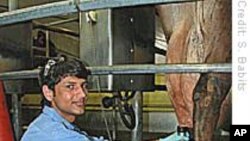Entry-level jobs have historically been a good fit for refugees who've come to the United States. But in the current economy, those have been in short supply. Now, some refugees in the Northwest are finding work in the dairy industry.
At Threemile Canyon Farms, in Boardman, Oregon, Ram Luitel watches dozens of dairy cows move through a milking parlor on a metal carousel. He helps supervise workers here as they clean udders and attach milking machines. And he checks to make sure the milk being pumped doesn't have any problems.
"I need to first test the teat of the cow and figure out which teat has bad milk, and if this is bad milk, I need to tie a ribbon on the leg," he explains.
Luitel started working here about six months ago, and says, "This is my first experience in my life working at a farm because I have never touched a cow by my own hand before." He's one of 30 refugees who have recently found jobs at the dairy.
From Bhutan to Boise to Boardman
Luitel is a refugee from Bhutan. About a year ago, the 21 year old and his family were resettled in Boise, Idaho by the International Rescue Committee, which arranged for training in dairy work. But the economy was uncertain and the refugees' eight month term of federal assistance was running out. Then they found out that this farm, five hours away in the neighboring state of Oregon, was hiring. Luitel now works with his dad and uncle at the dairy.
It turns out the farm has had a hard time filling jobs, even in a recession. Big farms like this one rely on workers from Mexico. But Walt Guterbock, Threemile Canyon's livestock manager, says it's become harder to tap into that applicant pool. "We, as a matter of policy, about two years ago started checking social security numbers of new employees. And the problem we had was we'd interview people and say out of 10, we'd like 5 and only one or two would have their numbers checked out," Guterbock says.
Without enough Mexican workers to legally fill all the jobs, Guterbock went looking elsewhere. He heard about unemployed refugees in Idaho. So Guterbock, whose own parents were refugees, got in touch with the International Rescue Committee.
"Some of these people would end up in homeless shelters because they don't have a job. So I think we've saved some of them from that fate," Guterbock says. The starting wage at the farm is $9.45 an hour. Workers and their families get full health benefits after six months. That's more than these refugees could have hoped for back in Boise.
A growing international labor force
Refugees, from Burundi to Iraq, make up only a sliver of the farm's workforce. The majority of the workers are still from Mexico. Guterbock is among those U.S. employers who want permanent immigration reform, but he says hiring refugees has helped fill a labor gap.
"That is not the solution to the agricultural labor issue facing the U.S. In other words, we need to address the undocumented people who are already here working," he says.
Work at the dairy is hard. Ram Luitel works 50 to 60 hours a week and doesn't get paid a bonus for the extra time. He and the other Bhutanese refugees face long drives to see their families in Boise during their time off. But Luitel says he doesn't mind.
"I am Hindu. To Hindu, cow is a god. So we say that we are serving God," Luitel says.
He views working at the dairy as a way to start over and get his financial feet firmly planted. He wants to work in the medical field and become a veterinarian. But for now he's learning to navigate the dairy world and integrate into a new community, and as a bonus, he says he's been learning some Spanish language skills.




